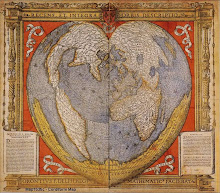Monday, August 11, 2008
worldmaking and astronomy
As I began doing the readings for this week, I paused for a moment to consider the material in the context of this course. Bruno's discussion of Copernicus and whether or not the earth was the center of the universe and Galileo's discussion of how he came about some of his discoveries is all very fascinating stuff, but after reading exstensively on conquests, the new world and Indians for the past few weeks, on the surface it did not seem to fit. When so far we have been reading about how the modern world came to be, gradually introducing more lands, new rulers, and different wars, being very much focused on land and places, why now do we turn to the sky? I'm not entirely sure I know, but for me, the transition was not all that difficult in fact. It seems to me that we have been going through the progression of the world, and how it has come to be what it is today and it is not simply the expansion of land and political power, but also the progression of human thought that plays a large role in world making. Reading about Galileo was interesting because I felt like I was litsening to a great mind at work. It was fascinating to see the facts and knowledge that we know now, unfold and come into being. This class has taught me a lot about history but in doing that it has forced me to think about the beginning of civilization, how we got to point B from point A, beginning with the most basic of things. So when we think about world making it goes further than the rise and fall of different empires. We must also consider how the human mind has been able to grasp things over centuries.
Subscribe to:
Post Comments (Atom)

No comments:
Post a Comment